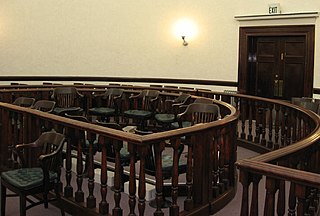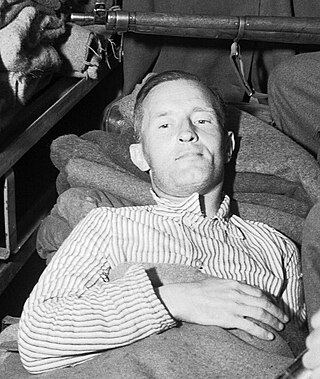Inquests in England and Wales are held into sudden or unexplained deaths and also into the circumstances of and discovery of a certain class of valuable artefacts known as "treasure trove". In England and Wales, inquests are the responsibility of a coroner, who operates under the jurisdiction of the Coroners and Justice Act 2009. In some circumstances where an inquest cannot view or hear all the evidence, it may be suspended and a public inquiry held with the consent of the Home Secretary.

A jury trial, or trial by jury, is a legal proceeding in which a jury makes a decision or findings of fact. It is distinguished from a bench trial in which a judge or panel of judges makes all decisions.

Perjury is the intentional act of swearing a false oath or falsifying an affirmation to tell the truth, whether spoken or in writing, concerning matters material to an official proceeding.

A jury is a sworn body of people (jurors) convened to hear evidence and render an impartial verdict officially submitted to them by a court, or to set a penalty or judgment.

Under the law of the United Kingdom, high treason is the crime of disloyalty to the Crown. Offences constituting high treason include plotting the murder of the sovereign; committing adultery with the sovereign's consort, with the sovereign's eldest unmarried daughter, or with the wife of the heir to the throne; levying war against the sovereign and adhering to the sovereign's enemies, giving them aid or comfort; and attempting to undermine the lawfully established line of succession. Several other crimes have historically been categorised as high treason, including counterfeiting money and being a Catholic priest.
A hung jury, also called a deadlocked jury, is a judicial jury that cannot agree upon a verdict after extended deliberation and is unable to reach the required unanimity or supermajority. Hung juries usually result in the case being tried again.
Witness tampering is the act of attempting to improperly influence, alter or prevent the testimony of witnesses within criminal or civil proceedings.
Concealment of birth is the act of a parent failing to report the birth of a child. The term is sometimes used to refer to hiding the birth of a child from friends or family, but is most often used when the appropriate authorities have not been informed about a stillbirth or the death of a newborn. This is a crime in many countries, with varying punishments.

The Criminal Justice Act 2003 is an Act of the Parliament of the United Kingdom. It is a wide-ranging measure introduced to modernise many areas of the criminal justice system in England and Wales and, to a lesser extent, in Scotland and Northern Ireland. Large portions of the act were repealed and replaced by the Sentencing Act 2020.

The Criminal Lunatics Act 1800 was an Act of the Parliament of Great Britain that required and established a set procedure for the indefinite detention of mentally ill offenders. It was passed through the House of Commons in direct reaction to the trial of James Hadfield, who attempted to assassinate King George III.
An information is a formal criminal charge which begins a criminal proceeding in the courts. The information is one of the oldest common law pleadings, and is nearly as old as the better-known indictment, with which it has always coexisted.

In the legal jurisdiction of England and Wales, there is a long tradition of jury trial that has evolved over centuries. Under present-day practice, juries are generally summoned for criminal trials in the Crown Court where the offence is an indictable offence or an offence triable either way. All common law civil cases were tried by jury until the introduction of juryless trials in the new county courts in 1846, and thereafter the use of juries in civil cases steadily declined. Liability to be called upon for jury service is covered by the Juries Act 1974.

The Infanticide Act 1938 is an Act of the Parliament of the United Kingdom. It creates the offence of infanticide for England and Wales.

Scots criminal law relies far more heavily on common law than in England and Wales. Scottish criminal law includes offences against the person of murder, culpable homicide, rape and assault, offences against property such as theft and malicious mischief, and public order offences including mobbing and breach of the peace. Scottish criminal law can also be found in the statutes of the UK Parliament with some areas of criminal law, such as misuse of drugs and traffic offences appearing identical on both sides of the Border. Scottish criminal law can also be found in the statute books of the Scottish Parliament such as the Sexual Offences (Scotland) Act 2009 and Prostitution (Scotland) Act 2007 which only apply to Scotland. In fact, the Scots requirement of corroboration in criminal matters changes the practical prosecution of crimes derived from the same enactment. Corroboration is not required in England or in civil cases in Scotland. Scots law is one of the few legal systems that require corroboration.

The Libel Act 1843, commonly known as Lord Campbell's Libel Act, was an Act of the Parliament of the United Kingdom. It enacted several important codifications of and modifications to the common law tort of libel.

The Piracy Act 1850, sometimes called the Pirates Repeal Act 1850, is an Act of the Parliament of the United Kingdom. It relates to proceedings for the condemnation of ships and other things taken from pirates and creates an offence of perjury in such proceedings.

The Criminal Justice Administration Act 1851 is an Act of the Parliament of the United Kingdom.

The Criminal Procedure Act 1865, commonly known as Denman's Act, is an Act of the Parliament of the United Kingdom.

The Perjury Act 1911 is an act of the Parliament of the United Kingdom. It creates the offence of perjury and a number of similar offences.
The administration of justice is the process by which the legal system of a government is executed. The presumed goal of such an administration is to provide justice for all those accessing the legal system.









